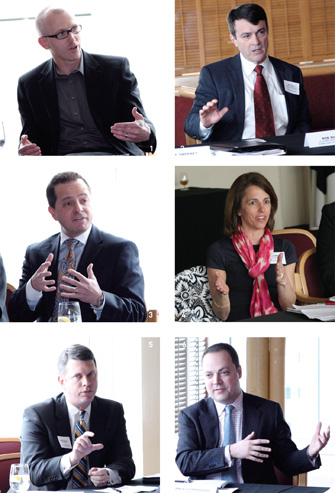
1. The Kansas City region needs universities with stronger academic reputations, said BATs Chris Isaacson. | 2. Bob Dunn noted that a deep talent pool in Kansas City kept leadership pipelines flowing. | 3. Troy Stremming said the contributions of private-sector philanthropists have been an enormous boost for the region. | 4. Debbie Wilkerson said it was important to remember the “nice” factor at work here. | 5. Structurally, said Kevin Kramer, the Kansas City region isn’t set up to produce strong leadership in the public sector. | 6. Angelo Trozzolo cautioned that one of the region’s biggest strenths—its small-town connectivity—could also become a weakness if people stop thinking in bold terms about what the community really needs.
“I think perhaps our biggest stren-gth is also our biggest weakness,” said Angelo Trozzolo, president of Trozzolo Communications Group. “A phrase I like to use is kind of the One Degree of Kansas City. We see it in this room: If we don’t know each other, we have people we know in common. We’re all connected by just one degree.” That helps get things done on some levels, he said, but “on the other hand, it causes us to perhaps be OK with not being as bold as we need to be.” He noted that Kansas City was once grouped with the likes of New York and Chicago as cities that set the tone for the rest of the country. “We were the first to build two stadiums together, and the airport, love it or hate it, was unique,” Trozzolo said.
Chris Isaacson sensed a void in higher education. “I think one of the things where we struggle with here is fostering entrepreneurship due to a lack of schooling,” he said. “Why does Silicon Valley exist? Because there’s Stanford, frankly. No offense to any of the schools around here, but we don’t have a Stanford of the Plains.”
The K-12 piece is just as significant, most notably with the Kansas City school district, several participants noted. “That just feels like the albatross around the neck of this community,” said Christine Kemper. “I don’t care if we come up with 10 terrific things we do in this community, why can we not fix our school district?”
That point resonated with Courtney Goddard, associate general counsel for Park University—earlier in her career, she represented the Kansas City district. “It’s going to be very difficult to really move forward when the school district is where it is,” she said. “After working there on a daily basis for a number of years as their legal counsel, I don’t think the general public really understands how bad it is.”
Kevin Kramer, vice president for commercial lending at Bank Midwest, noted the impact of political and geographic boundaries. “Structurally, we’re not set up to have a strong leader,” he said. “The state line runs right down the middle, we have six counties in the area, a weak-mayor form of government—all of that makes it tough from an elected officials’ point of view to become a true leader in the community.”
And yet, he noted, that same lack of public-side influence created a void that had been filled by successful business figures. “What’s happened,” he said, “is folks like the Halls, the Kempers, the Helzbergs, the Stowers—those are the people who helped lead the community, along with others I’ve missed—those are the folks who have stepped forward.”